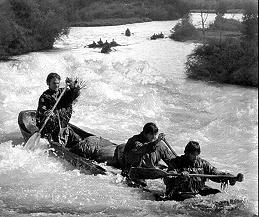| Missouri Loves Company | ||
| Lewis and Clark: Great Journey West | ||
 |
||
| Review by Ross Anthony | ||
|
"The equivalent of a mission to the moon." Lewis and Clark, commissioned by Thomas Jefferson in 1804 to map and explore the great Northwest, spent 2.5 years hiking, climbing, boating from St. Louis to what is now Astoria, Oregon. This documentary follows the duo (played by two able actors) along with their crew through streams, rivers, prairies, mountains. Jefferson's actual instructions: "The object of your mission is to explore the Missouri river, & such principal stream of it, as, by it's course and communication with the waters of the Pacific ocean, whether the Columbia, Oregon, Colorado or any other river may offer the most direct & practicable water communication across this continent for the purpose of commerce." This straight-on documentary hosts no gimmicks. Though on occasion, a storm may have been manmade, or stunt man have slipped down a cliff; most of the images capture the adventurous restepping into the wide open, gloriously beautiful and oft times treacherous American Northwest. Jeff Bridges narrates over seldom flashy, but consistently solid images of the undertaking: pulling boats through streams, sleeping in the snow, confronting and negotiating with Indians. Quite a few "IMAXy" aerial shots are included. They're enjoyable, but I wanted each cut to hold longer (especially once over the peak). This would have provided even more contrast to the picture's quicker than normal-doc pace. Some memorable surface shots include a countryside full of buffalo (would have loved to see the Indians hunting them), a canoe-mounted-camera white-water rafting sequence, a bear attack shot from the P.O.V. of bear, a barking prairie dog. The script is always interesting, always entertaining, politically sensitive (without going over the top). We see the group picking berries, but never hunting and/or trapping. It's a hankering omission to a story of exploration and survival. In contrast, special attention is paid to an Indian woman and her infant child who joined the men for a substantial portion of the trip, contributing greatly to the mission as did other Indian tribes. On a lighter note, one segment jerked this audience into a group chuckle. As the team prepared to canoe through some rocky rapids, "nearby tribes gathered to watch the white man drown." My screening was based on an answer print, which had a few transition kinks to work out. We were told there may be some other changes including, perhaps, the ending music. I do hope that change doesn't take place ... I enjoyed that Native American sounding piece. Most likely I enjoyed the rest of the music, but as a good production will do, I was pulled in and not conscious of it. |
||
|
|
||
|
||
Grade..........................Strong B+ |
||
Copyright © 2002. Ross Anthony, currently based in Los Angeles, has scripted and shot documentaries, music videos, and shorts in 35 countries across North America, Europe, Africa and Asia. For more reviews visit: RossAnthony.com |
||
|





